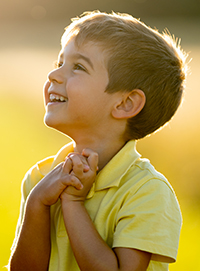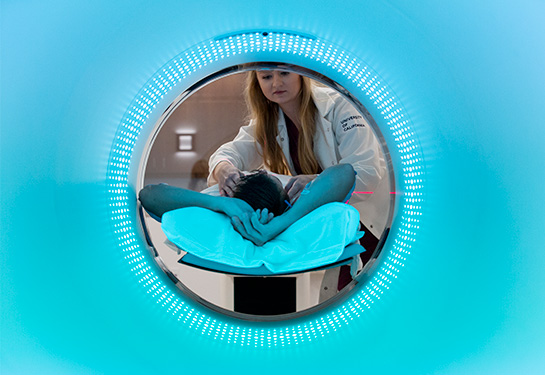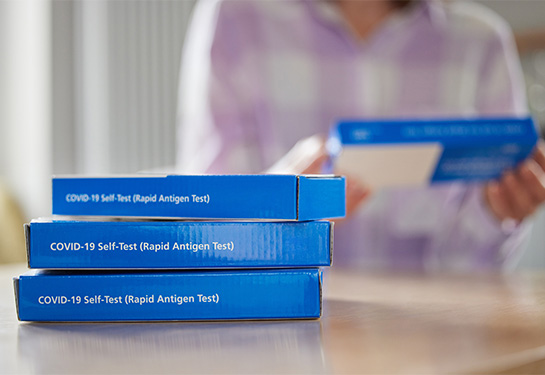Gratitude: The best medicine during tough times
A gratitude expert explains why learning to be grateful can help us through crises like COVID-19
The best way to protect yourself against COVID-19 infection is to get the vaccine, mask up and practice social distancing. But how do we protect ourselves from the other side of things – the anxiety and sadness that have accompanied this life-altering pandemic? The answer, says one UC Davis expert, lies within.

Robert Emmons, professor of psychology at UC Davis, says the best medicine for mental health is a regular practice of gratitude. “It is precisely during difficult times where gratitude achieves its maximal power,” said Emmons, who is a world-recognized expert on the science of gratitude. “In the face of demoralization, gratitude has the power to energize. In the face of brokenness, gratitude has the power to heal. In the face of despair, gratitude has the power to bring hope.”
Of course, it may not be easy to feel grateful if you’ve lost a job, lost a loved one to COVID-19 or are struggling with long-haul COVID symptoms. It’s not easy if you’re missing friends and family members that you haven’t hugged in over a year, either.
Emmons says if you’re not feeling grateful right now, consider prospective gratitude. “Project yourself into the future and imagine how grateful you will be when your circumstances change. This has been very powerful for people during the coronavirus pandemic. It’s a defiant attitude that insists that gratitude is the best approach to life, no matter what.”
Study finds growth in gratitude
A study conducted by Emmons, in collaboration with Gracianna Winery in Healdsburg, reinforced this idea of a prospective approach to gratitude. The researchers examined the frequency of grateful feelings within the unique challenges presented by the pandemic. It was the first study to investigate anticipated gratitude, or how grateful people expect to feel in the future.
Gratitude is good for kids, too! Helping our children learn how to incorporate gratitude into their lives has many benefits for them, such as improved sleep, health and happiness. This was the topic of a recent Kids Considered podcast by Dean Blumberg, chief of pediatric infectious diseases, and Lena van der List a UC Davis Health pediatrician. Their tips include:
Helping our children learn how to incorporate gratitude into their lives has many benefits for them, such as improved sleep, health and happiness. This was the topic of a recent Kids Considered podcast by Dean Blumberg, chief of pediatric infectious diseases, and Lena van der List a UC Davis Health pediatrician. Their tips include:
1. Try asking your child each night at bedtime to list one or two positive things that happened that day. These can be very simple – a tasty sandwich, a fun story they read or a good night’s sleep.
2. Help your children notice the things in their life to be grateful for and mark them. For example, if they receive a gift, ask them to reflect on how that makes them feel and encourage them to express their appreciation.
3. Try meditation – just 3-5 minutes a day can make a big difference.
4. Try simple, kid-friendly yoga.
5. Be a good gratitude role model by expressing your appreciation for your children and other good things in your life.
6. Encourage kids to openly express their gratitude. For example, by saying thank you to a friend for a fun play date.
7. Consider getting your child involved in a volunteer opportunity, like cleaning up a local park, visiting a local nursing home (when it’s safe to do so) or tutoring younger children.
Listen to the full Kids Considered podcast about gratitude.
Of the 511 adults surveyed from March-May, 2020, over 56% reported being very grateful, which was 17% greater than any other positive emotion (happy, hopeful, relieved, joyful). Sixty-nine percent of those asked also expected to be even more grateful in the future.
“The study showed that in the face of crises and during troubling times, people rely on positive feelings to cope, and they seem to turn to gratitude more than any other positive emotion,” Emmons said.
A grateful approach to life takes intention, and is a choice, notes Emmons. He says cultivating an attitude of gratitude takes regular practice. “We must make the distinction between feeling grateful and being grateful. The latter is a choice that endures and is relatively immune from gains and losses. That gives the person a built-in psychological immune system to cushion them.”
Health benefits of gratitude
There are clear medicinal benefits to gratitude.
“There is evidence that grateful people are more resilient to stress in general, whether we’re talking about minor everyday hassles or major personal upheavals,” noted Emmons.
He says clinical trials indicate that the practice of gratitude can lower blood pressure, improve immune function and facilitate more efficient sleep. It’s also been associated with higher levels of good cholesterol (HDL), lower levels of bad cholesterol (LDL), fewer symptoms of depression, less fatigue and higher levels of heart rate variability (a marker of cardiac health).
A recent review of all of the studies on gratitude and cardiovascular health outcomes, published in the Journal of Positive Psychology, concluded that, “gratitude can be a low-cost intervention in health care that can lead to improved health behaviors and better cardiovascular outcomes for patients living with cardiovascular disease.”
Three ways to get started
“It can take some work at first, to be sure,” Emmons said. “It is essential to remember that gratitude is a choice, not an emotion.”
- One good place to begin is with a gratitude journal. Record a few things that you’re thankful for each day. It can be simple, such as a hot bath, a walk with your dog or a delicious snack. One study showed that doing this for two weeks reduced perceived stress and depression among health care practitioners.
This article from the UC Berkeley Greater Good Science Center has tips for keeping a gratitude journal.
- Another way to incorporate more gratefulness is to focus on the language you use. “Grateful people use the language of gifts, givers, blessings, fortune and abundance, while ungrateful people tend to focus on deprivation, regrets, need or scarcity,” explained Emmons.
- Consider the attitude of gratefulness as the ability to feel grateful regardless of circumstances. “I think the biggest obstacle is that most of us, most of the time, reduce gratitude to a reaction to circumstances. We reduce it to feeling good after something good happens, but this is false. If that were true, then our gratitude would be totally conditional on what happens to us. Think of gratitude as a core aspect of resilience and helpful in times of crisis.”



